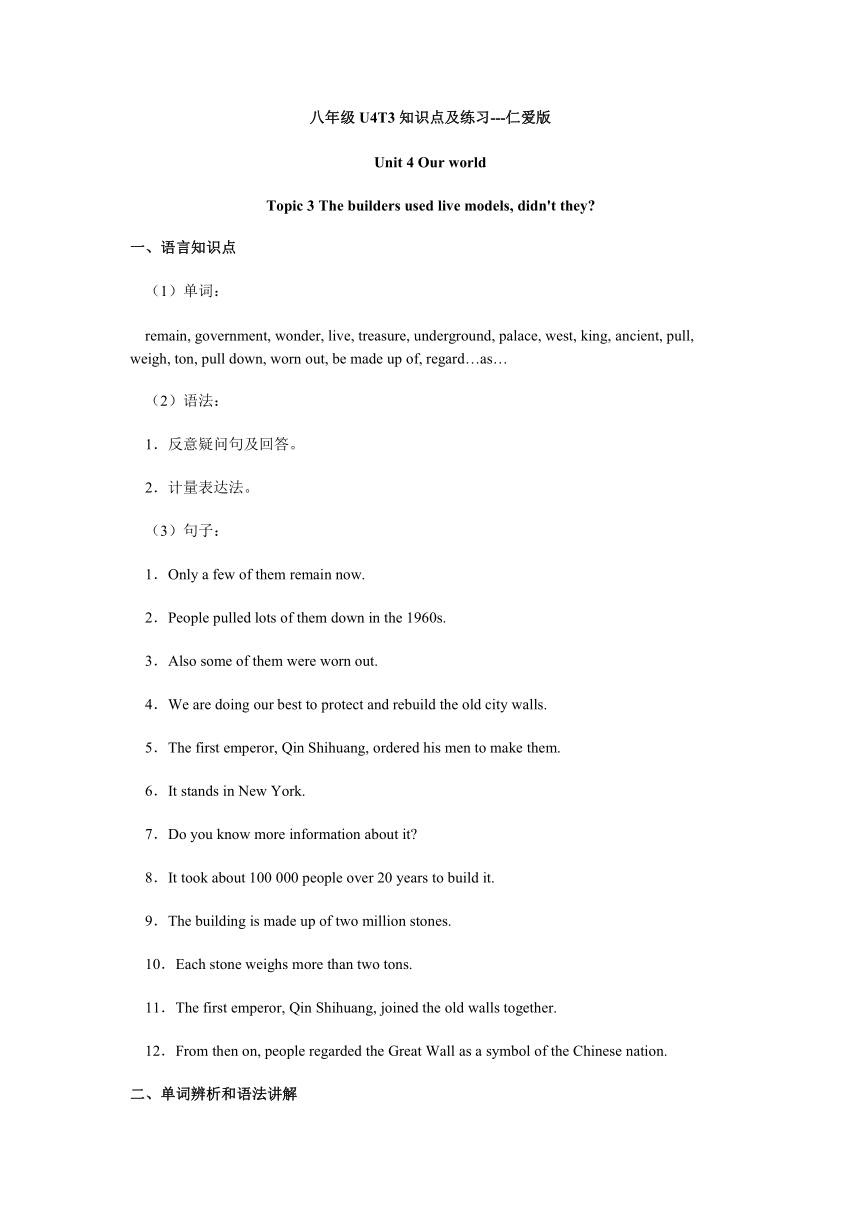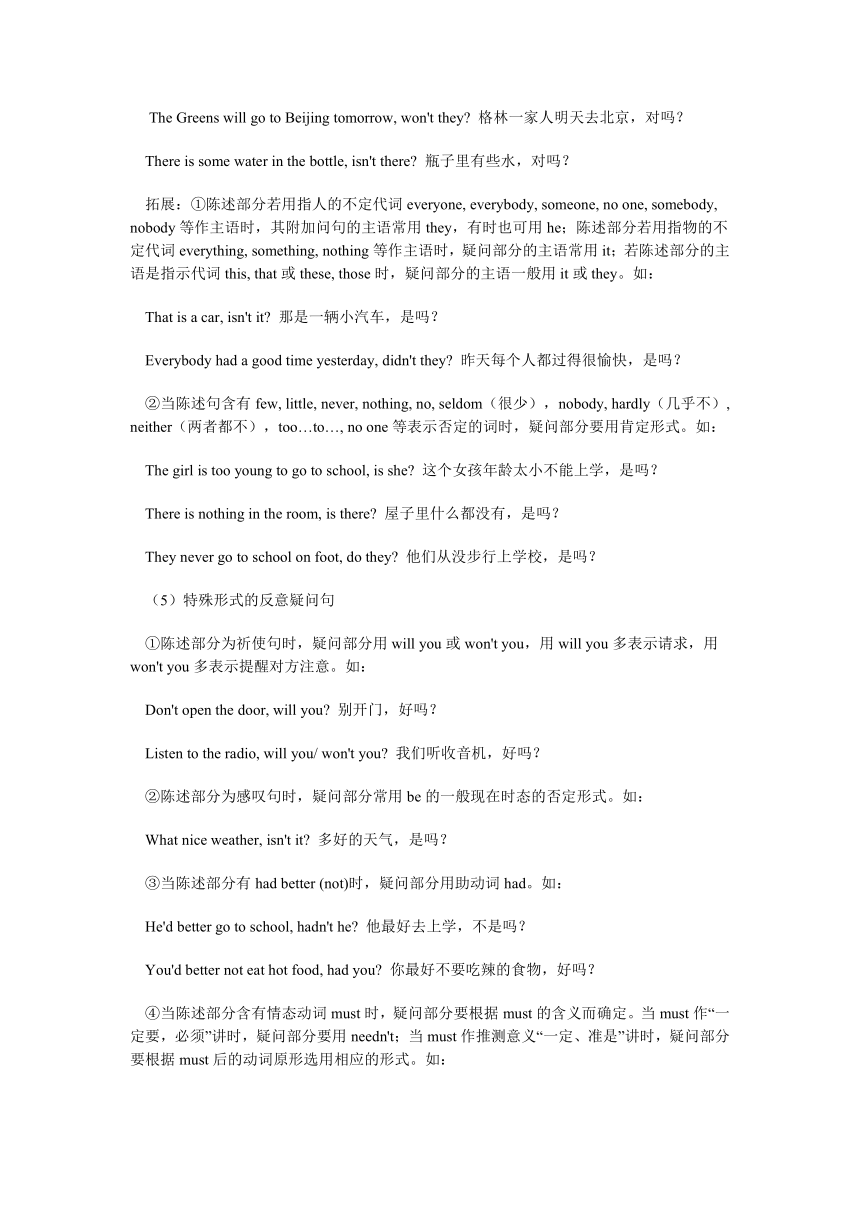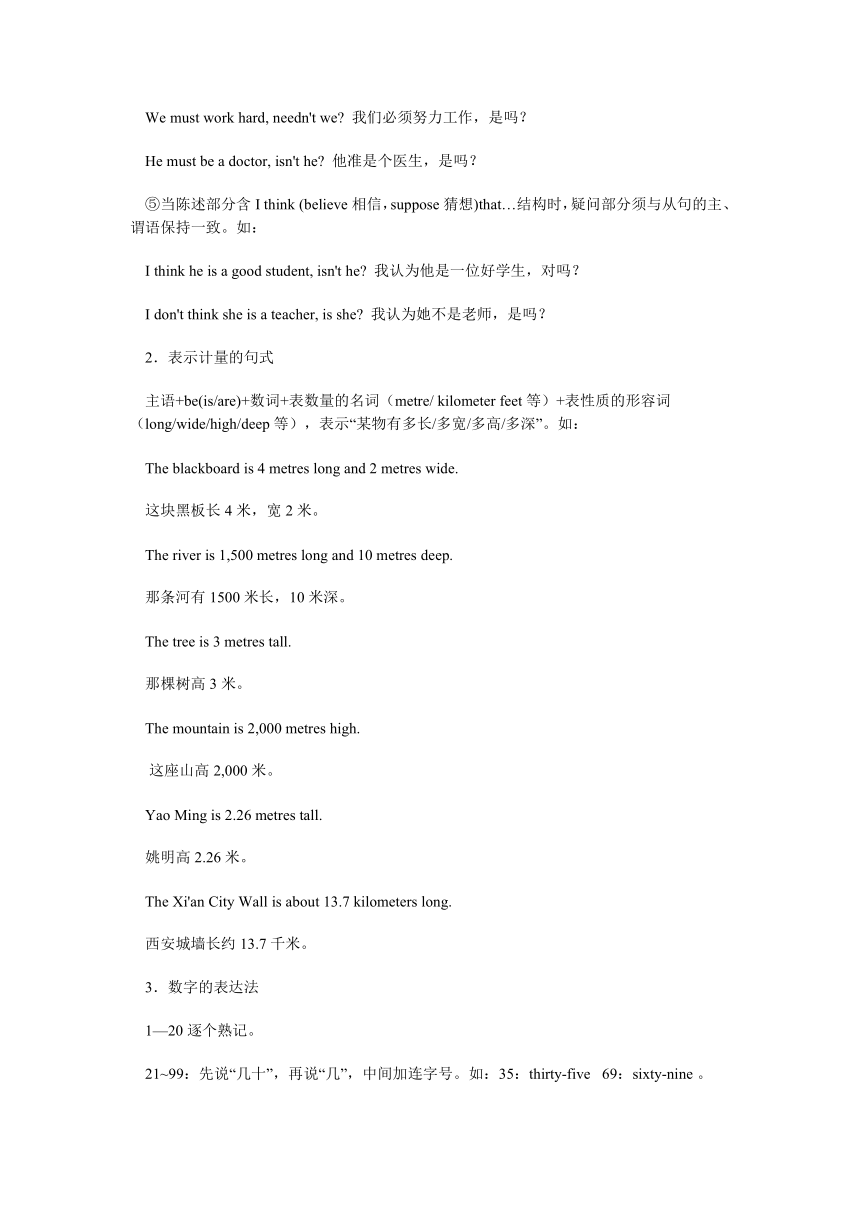Unit 4 Our World Topic 3 The Internet makes the world smaller 知识点及练习(含答案)
文档属性
| 名称 | Unit 4 Our World Topic 3 The Internet makes the world smaller 知识点及练习(含答案) |

|
|
| 格式 | zip | ||
| 文件大小 | 55.0KB | ||
| 资源类型 | 教案 | ||
| 版本资源 | 仁爱科普版 | ||
| 科目 | 英语 | ||
| 更新时间 | 2019-12-15 18:22:31 | ||
图片预览





文档简介
八年级U4T3知识点及练习---仁爱版
Unit 4 Our world
Topic 3 The builders used live models, didn't they?
一、语言知识点
????(1)单词:
????remain, government, wonder, live, treasure, underground, palace, west, king, ancient, pull, weigh, ton, pull down, worn out, be made up of, regard…as…
????(2)语法:
????1.反意疑问句及回答。
????2.计量表达法。
????(3)句子:
????1.Only a few of them remain now.
????2.People pulled lots of them down in the 1960s.
????3.Also some of them were worn out.
????4.We are doing our best to protect and rebuild the old city walls.
????5.The first emperor, Qin Shihuang, ordered his men to make them.
????6.It stands in New York.
????7.Do you know more information about it?
????8.It took about 100 000 people over 20 years to build it.
????9.The building is made up of two million stones.
????10.Each stone weighs more than two tons.
????11.The first emperor, Qin Shihuang, joined the old walls together.
????12.From then on, people regarded the Great Wall as a symbol of the Chinese nation.
二、单词辨析和语法讲解
????1.反意疑问句
????(1)反意疑问句的定义:
????反意疑问句是附在陈述句之后,对陈述句所说的事实或观点提出疑问,因此也叫附加疑问句。
????(2)反意疑问句的组成
????反意疑问句由两部分组成,前一部分为陈述句,后一部分为简短问句,前后两部分用逗号隔开。若前一部分为肯定句,后一部分用否定形式,即“肯定陈述句+否定的简短问句”;若前一部分为否定句,后一部分用肯定形式,即“否定陈述句+肯定的简短问句”。总之,前后两部分的人称、数、时态必须保持一致。可以这样记忆:反意疑问,理解其意;前后相反,构成问句;时态一致,句型统一;前否后肯,回答注意。如:
????You are a teacher, aren't you? 你是老师,对吧?
????The builders used live models, didn't they? 建筑工人用活体模型,是吗?
????He can't swim, can he? 他不会游泳,是吗?
????(3)反意疑问句的回答
????对于反意疑问句的回答,不管问题的提法如何,若事实是肯定的,就要用yes;若事实是否定的,就要用no。回答的翻译方法分两种情况:当陈述部分只是肯定形式时,yes/no正常翻译;当陈述部分是否定形式时,yes译成“不”,no译成“是的”。如:
????—Mr. Green is a worker, isn't he? 格林先生是一名工人,是吗?
????—Yes, he is. /No, he isn't. 是的,他是。不,他不是。
????—Lanlan isn't a student, is she? 兰兰不是学生,是吗?
????—Yes, she is. /No, she isn't. 不,她是。对,她不是。
????(4)陈述句变反意疑问句的技巧
????①疑问部分的主语要用其相应的代词(there be结构除外)。
????②谓语部分要用相应的助动词、情态动词及be动词形式。当陈述部分是否定时,疑问部分用相应的肯定形式;当陈述部分是肯定形式时,疑问部分用相应的否定形式,且谓语部分要用相应的缩写形式。如:
????Jim watched TV last night, didn't he? 吉姆昨晚看电视了,是吗?
??? The Greens will go to Beijing tomorrow, won't they? 格林一家人明天去北京,对吗?
????There is some water in the bottle, isn't there? 瓶子里有些水,对吗?
????拓展:①陈述部分若用指人的不定代词everyone, everybody, someone, no one, somebody, nobody等作主语时,其附加问句的主语常用they,有时也可用he;陈述部分若用指物的不定代词everything, something, nothing等作主语时,疑问部分的主语常用it;若陈述部分的主语是指示代词this, that或these, those时,疑问部分的主语一般用it或they。如:
????That is a car, isn't it? 那是一辆小汽车,是吗?
????Everybody had a good time yesterday, didn't they? 昨天每个人都过得很愉快,是吗?
????②当陈述句含有few, little, never, nothing, no, seldom(很少),nobody, hardly(几乎不), neither(两者都不),too…to…, no one等表示否定的词时,疑问部分要用肯定形式。如:
????The girl is too young to go to school, is she? 这个女孩年龄太小不能上学,是吗?
????There is nothing in the room, is there? 屋子里什么都没有,是吗?
????They never go to school on foot, do they? 他们从没步行上学校,是吗?
????(5)特殊形式的反意疑问句
????①陈述部分为祈使句时,疑问部分用will you或won't you,用will you多表示请求,用won't you多表示提醒对方注意。如:
????Don't open the door, will you? 别开门,好吗?
????Listen to the radio, will you/ won't you? 我们听收音机,好吗?
????②陈述部分为感叹句时,疑问部分常用be的一般现在时态的否定形式。如:
????What nice weather, isn't it? 多好的天气,是吗?
????③当陈述部分有had better (not)时,疑问部分用助动词had。如:
????He'd better go to school, hadn't he? 他最好去上学,不是吗?
????You'd better not eat hot food, had you? 你最好不要吃辣的食物,好吗?
????④当陈述部分含有情态动词must时,疑问部分要根据must的含义而确定。当must作“一定要,必须”讲时,疑问部分要用needn't;当must作推测意义“一定、准是”讲时,疑问部分要根据must后的动词原形选用相应的形式。如:
????We must work hard, needn't we? 我们必须努力工作,是吗?
????He must be a doctor, isn't he? 他准是个医生,是吗?
????⑤当陈述部分含I think (believe相信,suppose猜想)that…结构时,疑问部分须与从句的主、谓语保持一致。如:
????I think he is a good student, isn't he? 我认为他是一位好学生,对吗?
????I don't think she is a teacher, is she? 我认为她不是老师,是吗?
????2.表示计量的句式
????主语+be(is/are)+数词+表数量的名词(metre/ kilometer feet等)+表性质的形容词(long/wide/high/deep等),表示“某物有多长/多宽/多高/多深”。如:
????The blackboard is 4 metres long and 2 metres wide.
????这块黑板长4米,宽2米。
????The river is 1,500 metres long and 10 metres deep.
????那条河有1500米长,10米深。
????The tree is 3 metres tall.
????那棵树高3米。
????The mountain is 2,000 metres high.
??? 这座山高2,000米。
????Yao Ming is 2.26 metres tall.
????姚明高2.26米。
????The Xi'an City Wall is about 13.7 kilometers long.
????西安城墙长约13.7千米。
????3.数字的表达法
????1—20逐个熟记。
????21~99:先说“几十”,再说“几”,中间加连字号。如:35:thirty-five? 69:sixty-nine?。
????101~999:先说“几百”,再加and,再加末尾两位数或一位数。如:
????226:two hundred and twenty-six
????518:five hundred and eighteen
????905:nine hundred and five
????4位和4位以上的数字:先从后向前数,每三位数空半个阿拉伯数字的位置,第一个空前为thousand(千),第二个空前为million(百万),第三个空前为billion(十亿,美式)或thousand million(英式),然后一节一节读出。(或每三位为一段,用逗号分开,第一个逗号前是thousand,第二个逗号前是million,第三个逗号前是billion。)如:
????2 002:two thousand and two
????6 000:six thousand
????9 876:nine thousand,eight hundred and seventy-six
????198 407:a(one)hundred and ninety-eight thousand,four hundred and seven
????18 657 421:eighteen million,six hundred and fifty-seven thousand,four hundred and twenty-one
????注意在上述这样数词中,hundred,thousand,million等词一般用单数形式。如:
????ten thousand 一万
????a hundred thousand 十万
????a hundred million 一亿
????a thousand million 十亿
????a billion 十亿
????注意:英语没有单独表示“万”和“亿”的单词。表示“一万”要用ten thousand,表示“一千万”要用ten million,表示“一亿”要用a hundred million。
????4.find的用法:
????(1)find + n. 如:
????The day I got back, I found a note on my desk. 我回来那天,在书桌上发现了一张便条。
????(2)find + that 宾语从句? 如:
????She found that no one could answer the question. 她发现没有人能回答这个问题。
????(3)find + n. +adj. 如:
????You will find the book difficult. 你会发现这是本很难的书。
????We found the door closed. 我们发现门关着。
????(4)find+形式宾语(it)+adj.+动词不定式/that从句,此用法与“think”相同,如:
????We found it difficult to carry this heavy box. 我们发现很难搬动这个重箱子。
三、课文讲解
????1.Only a few of them remain now. 现在所剩不多了。
????remain在此句中是实义动词,表示“保留、保持”,通常主语是物体/品。
????如:
????Very little of the house remained after the fire. 火灾之后,这座房子所剩无几。
????remain还可以用作系动词,表示“仍然是、保持不变”,后面常接形容词。
????如:
????The price of rice is likely to remain unchanged. 大米的价格可能会保持不变。
????2.People pulled lots of them down in the 1960s.
????二十世纪六十年代,人们把大多数城墙都拆了。
????(1)pull down推倒,拆毁,常用来指建筑物被拆毁。如:
????Many people in this village pulled down the old houses and rebuilt new ones.
????这村里的很多人拆毁了旧房子并且重建了新房。
????(2)in the 1960s在二十世纪六十年代。即1960到1969年之间,而非1960这一年。读作nineteen sixties。如:
????in the 1870s在十九世纪七十年年代
????3.Also some of them were worn out. 古城墙中还有些损坏了。
????Most old city walls were pulled down in the 1960s.
????大部分古城墙在二十世纪六十年代被拆毁了。
????be worn out和be pulled down均属被动语态,
????如:
????My shoes are all worn out, so I have to buy a new pair.
????我的鞋都穿破了,所以我得买双新鞋。
????My old house was pulled down last year. 我家的老房子去年被拆毁了。
????4.We are doing our best to protect and rebuild the old city walls.
????我们正尽最大努力保护和重建古城墙。
????(1)do one's best to do sth. =try one's best to do sth. 尽某人最大努力去做某事。
????因此上面句子也可说成:
????We are trying our best to protect and rebuild the old city walls.
????(2)protect sb. /sth. 保护、防护某人/某物。如:
????protect…from…保护……免受……的伤害
????We should protect the animals around us. 我们应该保护身边的动物。
????Try to protect your skin from the sun. 尽量保护皮肤不被太阳晒。
????(3)rebuild v. 意为“重建(某物)、使恢复”。
????re+build(建造),在动词前加前缀re,表“又,再,重新”之意。如:
????rewrite(重写),retell(复述)等。
????5.The first emperor, Qin Shihuang, ordered his men to make them.
????第一个皇帝秦始皇命令他的百姓铸造了他们。
????order v. 命令,嘱咐。常构成order sb. to do sth. 命令(嘱咐)某人做某事。
????如:????
????The doctor ordered her to stay in bed. 医生叫她卧床休息。
????He always orders others to do things for him. 他总是命令别人为他做事。
????6.It stands in New York. 它矗立在纽约。
????stand v. 位于,矗立于。如:
????His house stands on a hill. 他的房子坐落在小山上。
????A tall tree stands in the garden. 花园里耸立着一棵大树。
????7.Do you know more information about it?
??? 你还知道更多关于它的信息吗?
????more? adj. 在这里是“另外的、更多的、附加的”意思。它通常放在数词后。如:
????Do you want some more tea? 你还要些茶吗?
????Can you wait for two more hours? 你能再等两小时吗?
????8.It took about 100 000 people over 20 years to build it.
????建造金字塔花了大约十万人二十多年的时间。
????(1)句中it为形式主语,不定式短语to build it为真正的主语。
????这里是句型:It takes sb. some time to do sth. 做某事花费某人多少时间。
????如:
????It took me two hours to wash clothes yesterday. 昨天我花了两个小时洗衣服。
????It takes them twenty minutes to do morning exercises every day. 每天他们花二十分钟做早操。
????在英语中,不定式作主语时,常用it作形式主语,而把真正的主语“不定式”放在句尾。
????如:
????To visit the Summer Palace is a great pleasure. 参观颐和园是一件愉快的事。
????此句可改为:It is a great pleasure to visit the Summer Palace.
????又如:To improve the living conditions is our wish.
????改善生活条件是我们的理想。
????可改为:It is our wish to improve the living conditions.
????再如:To write an English letter is difficult for me.
????对我来说,写英文书信很难。
????可改为:It is difficult for me to write an English letter.
????9.The building is made up of two million stones.
????这座建筑是由两百万块石头彻成的。
????be made up of…由……组成,由……构成。如:
????The football team is made up of eleven players. 足球队由十一名队员组成。
????Clouds are made up of little drops. 云是由小水珠组成的。
????Animal bodies are made up of cells. 动物的身体是由细胞组成的。
????10.Each stone weighs more than two tons. 每块石头重两吨多。
????weigh v. 与way同音。它的意思是“有……重量”,“称……的重量”如:
????How much does it weigh? It weighs ten kilos. 它多重?它重10公斤。
????I weighed myself yesterday. 我昨天称了体重。
????11.The first emperor, Qin Shihuang, joined the old walls together.
????第一个皇帝,秦始皇把古城墙连结起来。
????join v. 连接;结合,联合。
????join…together把……连结起来。如:
????The highway joined our town to the city.
????这条高速公路把我们镇同城市连接起来。
????Please join these things together. 请把这些东西连接起来。
????12.From then on, people regarded the Great Wall as a symbol of the Chinese nation.
????从那时起,人们把长城看成是中华民族的象征。
????(1)from then on从那时起,类似的短语还有from now on从今以后。如:
????You'd better speak English as much as possible from now on.
????从今以后,你最好尽可能多说英语。
????from then on常跟一般过去时连用。如:
????From then on, I began to learn English. 从那时起,我开始学英语了。
????拓展:from now on从现在起,常跟一般将来时连用。如:
????From now on, she'll have to walk to school. 从现在起,她将不得不走路上学。
????(2)regard…as…把……看做,看待……。如:
????You can't regard him as a friend but a business associate.
????你不能把他看作朋友,他只是个生意合伙人。
????I regard him as my friend. 我把他当朋友。
????拓展:交际用语:
????A:Give my best regards to all your family! 代我向你全家问好!
????B:Thank you very much. 谢谢你的问候。
四、练习
Ⅰ、单项选择
????1. In my school, ______ are ______ small.
??? A. class; quite?? B. class; quiet?? C. classes; quite?? D. classes; quiet
????2. Mary is ______. Her hair is long and brown.
??? A. short and tall???????? B. tall and slim
????C. taller and shorter???? D. fat and slim?
????3. She spends less time ______ homework than John ______.
??? A. to so; does?? B. doing; does?? C. on doing; does?? D. doing; doing
????4. This meeting is ______ important than that ______.
??? A. more; one???? B. most; one???? C. more; ones???? D. most; ones
????5. Tim is a ______ boy, and he always answers his teachers' questions ______.
??? A. cleverly; correctly?????? B. clever; correct
????C. clever; correctly???????? D. cleverest; correct
????6. Funny people can always ______ when I feel ______.
??? A. make me happy; sad????????? B. make me happy; sadly
????C. make me happily; sad??????? D. make me happiness; sad
????7. Do you want ______ the sunset ______ tomorrow morning?
??? A. to watch; with I??????????? B. watch; with me
????C. watching; with me?????????? D. to watch; with me
????8. Where will you ______ sit ______ the bus?
??? A. choose; on????????????????? B. choose to; on
????C. to choose; in?????????????? D. chooses; in
????9. Nancy ______ softball ______ a week.
??? A. play; twice????? ???????????B. playing; twice
????C. plays; twice??????????????? D. plays; two time
????10. Sally's hair is ______ than ______.
??? A. much longer; Millie's????? B. many longer; Millie's
????C. much shorter; Millie??????? D. many shorter; Millie
????11. We never ______ because we always have ______ to do.
??? A. feels boring; something interesting
??? B. feels board; something interested
????C. feel board; something interesting
????D. feel board; something interested
????12. Tom ______ long legs and they do not fit ______ the school desks.
??? A. has; under???? B. have; under??? C. has; above??????? D. has; on
????13. The tower is made of ______ and is ______ tall.
??? A. metals; really?? B. metals; real?? C. metal; really?? D. metal; reality
????14. We have a big library ______ lots of ______.
??? A. with; useful book?????? B. of; useful books
????C. in; useful books??????? D. with; useful books
????15. Reading Week is always ______ because we want to read ______ books as well.
??? A. too short; all our friends????? B. too short; all our friend's
????C. too long; all our friends'???? D. too short; all our friends'
????16. He is _______ film star all ______ the world.
??? A. an popular; over??????????B. the most popular; over
????C. the more popular; at??????D. the most popular; above
????17. He put the pictures ______ the wall for everyone to ______.
??? A. in; look at?????? B. on; look?? C. on; look at???? D. in; see
????18. We only have half ______ hour of ______ every day.
??? A. a; homework?? B. an; homeworks?? C. a; homeworks????? D. an; homework
????19. He ______ get up late, so his ideal school ______ at 9:00 a.m.
??? A. likes; starts? B. like to; start? C. likes to; starts? D. likes to; start
????20. My brother often ______ and makes his friends ______.
??? A. tells jokes; to laugh????????B. tells jokes; laughing
????C. tells jokes; laugh???????????D. tells jokes; laughed
Ⅱ、完型填空
????We were going to play a team from a country school. They didn't come __1___ the match nearly began. They looked ___2__ than we thought. They wore dirty T-shirts and blue jeans and looked like farm boys. We thought they ___3___ saw a basketball before. We felt that we didn't ___4___ any practice to play with such a team. It was very late so they couldn't have any time to practice. The match began. One of our boys ___5___ the ball and he tried to give it to another one. But from out of nowhere a boy in a T-shirt ___6___ the ball and he quickly and beautifully got the ball into our basket and had two points. They ___7___ us. They had another two points in a minute. Soon it was all over. The country team ___8___ the match. Of course we knew that there was still another team ___9___ than any good team. But the important lesson we learned this time was: One can't tell a man or a team by the ____10___.
????(??? ) 1. A. when?????????? B. so????????? ???C. until?????? ?D. at
????(??? ) 2. A. stronger?????? B. younger?? ?????C. worse?????? ?D. better
????(??? ) 3. A. never????????? B. often?????? ???C. sometimes?? ?D. always
????(??? ) 4. A. have?????????? B. make??????? ???C. use???????? ?D. need
????(??? ) 5. A. got??????????? B. played????? ???C. took??????? ?D. carried
????(??? ) 6. A. caught??? ?????B. changed???? ???C. held??????? ?D. stopped
????(??? ) 7. A. surprised????? B. frightened???? C. admired????? D. smiled
????(??? ) 8. A. lost?????????? B. won??????????? C. got????????? D. had
????(??? ) 9. A. worse????????? B. less?????????? C. better?????? D. more
????(??? ) 10. A. T-shirt?????? B. appearance???? C. name???????? D. points
Ⅲ、阅读理解
A
Do you keep goldfish (金鱼)?
????A goldfish has two eyes. It has a mouth. A goldfish has fins (鳍). It has one fin on its back. It has a tail. Its fins and tail help it to swim. Fish swim in water and the water has some air in it. Goldfish eat fish-food. They don't eat a lot. Little worms (虫) are good for goldfish but bread is not. They will eat bread but it is not good for them. So don't feed(喂养)goldfish on bread.
????Goldfish have to have clean water. Green water weeds (水草) help to make water clean. Baby goldfish are not red. They are brown. But when they are big, they will be gold or orange or red.
????(??? ) 1. Which of the following is NOT TRUE?
????A. A goldfish has two eyes.??????????B. A goldfish has a mouth.
????C. A goldfish has only one fin.? ????D. A goldfish has a tail.
????(??? ) 2. Goldfish swim _____.
????A. with the help of its fins and tail?? B. with the help of its mouth
????C. with the help of its tail only???????? D. with the help of its fins only
????(??? ) 3. This passage tells us not to feed goldfish on _____.
????A. fish-food?????B. bread????? C. little worms??????? D. water
????(??? ) 4. When goldfish are small, they are _____.
????A. red???????????B. gold?????? C. yellow????????????? D. brown
????(??? ) 5. Goldfish _____.
????A. eat a lot???????????????????????? B. have to live in clean water
????C. don't eat little worms??????????? D. have to live in green water
B
????Zhou Qing is from Hainan Province, China. Last year he moved to Australia with his parents. They live in a house with a large garden. Zhou Qing has a good friend in his class called David. David is also Zhou Qing's next-door(隔壁的) neighbour. Every day after school, Zhou Qing and David play together. They always liked to play in David's garden. Zhou Qing's parents wanted to know why they always played in the same place. One day, Mr. Zhou asked Zhou Qing why they never play in other places. Zhou Qing answered, ‘Because his garden is more interesting than ours.' Mr. Zhou did not ask any more questions, but he still wanted to know why the boys thought David's garden was so interesting. The next afternoon, when Zhou Qing and David were playing in the garden, Mr. Zhou walked over there. At first he could not see them, but then he heard the boys' voices above him. He looked up and saw them in a tree, playing happily with a whole family of koalas!(考拉)
????(?? ) 6. How did Zhou Qing know David?
????A. They were brothers.????????? B. They were cousins.
????C. They were father and son.??? D. They were neighbours and classmates.
????(?? ) 7. Where did Zhou Qing and David like to play?
??? A. At school.?????????????? B. In Zhou Qing's garden.
????C. In David's garden.???????D. In the garden in their neighbourhood.
????(?? ) 8. Why did Mr. Zhou ask Zhou Qing a question one day?
????A. Because he wanted to know where he played each day.
????B. Because he wanted to know why Zhou Qing played in the same place every day.
????C. Because he wanted to know why Zhou Qing liked David.
????D. Because he wanted to know where David lived.
????(?? ) 9. Why did Zhou Qing and David play in the same place every day?
????A. Because they liked to play with the koalas.
????B. Because their parents could not find them there.
??? C. Because they liked the bigger garden.
????D. Because they liked to hide in the tree.
????(?? ) 10. Why could Mr. Zhou not see the boys at first?
????A. Because they were hiding from him.
????B. Because their were not in the garden.
????C. Because they were in a tree.
????D. Because they were hiding behind the koalas.
参考答案
Ⅰ、
????1——5 CBBAC??? 6——10 ADBCA ???11——15 CACDD?? 16——20 BCDCC
Ⅱ、
????1.C? 2.C? 3.A? 4.D? 5.A? 6.A? 7.A? 8.B? 9.C? 10.B
Ⅲ、
????A)1.C???? 2.A???? 3.B???? 4.D????? 5.B
????B)6.D???? 7.C???? 8.B???? 9.A????? 10.C
同课章节目录
- Unit 1 Playing Sports
- Topic 1 I'm going to play basketball.
- Topic 2 I'll kick you the ball again.
- Topic 3 The school sports meet is coming.
- Unit 2 Keeping Healthy
- Topic 1 You should brush your teeth twice a day.
- Topic 2 I must ask him to give up smoking.
- Topic 3 Must we exercise to prevent the flu?
- Unit 3 Our Hobbies
- Topic 1 What's your hobby?
- Topic 2 What sweet music!
- Topic 3 What were you doing at this time yesterday
- Unit 4 Our World
- Topic 1 What's the strongest animal on the farm?
- Topic 2 How can we protect ourselves from the eart
- Topic 3 The Internet makes the world smaller.
